Reportage

Ambassador and Head of Delegation of the European Union (EU) to Bangladesh Charles Whiteley. Photo: Collected
Ambassador Whiteley wants a wave of investment from Europe
The European Union (EU) wants to bring greater dynamism in its relations with Bangladesh engaging deeply in every way stating that "sky is the limit" when it comes to cooperation in boosting trade and investment.
"Sky is the limit when we cooperate with the world is changing very quickly. The European Union is changing. Bangladesh is changing. We've to make sure that our relationship reflects that change," Ambassador and Head of Delegation of the EU to Bangladesh Charles Whiteley told Dhaka Courier in an interview.
The Ambassador, who came back to Bangladesh after 12 years of his first posting here, said he wants to see the growing relationship between Bangladesh and the EU "deepened politically" engaging all segments of Bangladesh society, civil society and with robust trading ties.
He said the relationship needs to be characterized in terms of new challenges and exploring opportunities in the digital sphere.
"Bangladesh has such a big batch of young people who are educated and tech savvy. That's a huge resource for Bangladesh. We want to be with Bangladesh on that journey," said the envoy.
Wave of Investment
The EU diplomat said they want to see a "wave of investment" in Bangladesh from Europe with a level-playing field in place after addressing the challenges. "We'll be working together as partners."
He said there are so many areas where European countries would like to invest in Bangladesh and the two countries are working to address the issues for better business and investment climate in Bangladesh. "There's a commitment to do that."
The EU-Bangladesh Business Climate Dialogue was initiated in May 2016 with the aim to jointly remove impediments that obstruct EU trade and investment in Bangladesh.
The Ambassador said the Bengal tiger is actually seeking investment and definitely more work needs to be done.
Indo-Pacific
Responding to a question on the EU strategy on the Indo-Pacific region, the Ambassador said the growth is happening in the region and it is a vast area.
"The Indo-Pacific strategy really ties in well with our new priorities to Bangladesh. There's an opportunity to inject more energy into the Bangladesh-EU relationship," he said, highlighting the importance of connectivity, green transition, free trade and people to people link.
A joint communiqué on the "EU Strategy" for cooperation in the Indo-Pacific has been adopted recently, saying the European Union is stepping up its strategic engagement with the Indo-Pacific region as the region is increasing in strategic importance for Europe.
The EU thinks the future of the EU and the Indo-Pacific is interlinked. The EU is already the top investor, the leading development cooperation partner and one of the biggest trading partners in the Indo-Pacific region.
Ambassador Whiteley said they will be deeply engaging in renewable energy, regional energy and will help the transformation of Bangladesh energy system.
He said there is a lot of energy behind the relationship with development cooperation and trade benefits are there in place.
But Whiteley wants to move ahead to have a "more dynamic relationship" keeping in mind the emerging issues like connectivity, artificial intelligence, energy, renewable and climate change.
"In all those issues, Bangladesh is working with many of the partners. I want the EU to be central to that climate issue - green transition and prosperity," said the EU envoy.
Hard Work
The EU Ambassador said basically the GSP plus will be exactly the same in terms of benefits if they compare with the Everything but Arms (EBA), an initiative of the EU under which all imports to the EU from the Least Developed Countries are duty-free and quota-free, with the exception of armaments.
"But it'll be hard work. It's not going to be easy. It'll be a wrong assumption to think that it's going to be easy. It needs attention and it needs political commitment. I think that political commitment is clearly there from the government side," he said.
The EU, Whiteley said, as a long standing partner of Bangladesh, will continue to support Bangladesh to make that happen by investing in that process.
The EU's Generalised Scheme of Preferences Plus (GSP+) gives developing countries a special incentive to pursue sustainable development and good governance.
Eligible countries have to implement 27 international conventions on human rights, labour rights, the environment and good governance.
Thank You Bangladesh
"We're very happy that EBA has helped Bangladesh. Everyone says - thank you EU for the EBA. I say thank you Bangladesh for the high quality clothing that we get from Bangladesh. It's a very important point. We need Bangladesh's clothing," he said.
Clearly now, the Ambassador said, things are changing and the Bangladesh economy is evolving while the EU wants that success story to continue because they benefit from it.
"It's important for Bangladesh to diversify its export market. I think lots of work are going on that front," Whiteley added.
Bangladesh suggested an extension of the existing DFQF market access for Bangladesh in the European market by nine years beyond the three years of leeway after the graduation. Bangladesh can still enjoy the duty-free quota-free market access after 2026 up to 2029.
"That (Bangladesh's graduation) will present new challenges and also new opportunities. The transition period is set to 2029. I would underline that GSP plus is quite a complex thing. Nine countries can benefit from GSP plus now," said the envoy.
Whiteley is pleased that the import share criteria have been removed meaning the removal of one potential barrier to Bangladesh.
He said the ratification of the required international conventions is just one issue but implementation is the key.
"We want to maintain a very healthy trading relationship and we'll support Bangladesh on rights, governance, and labour standard fronts," Whiteley said, adding that Bangladesh's transition is a critical period.
Real Selling Point
The Ambassador said the EBA is a natural advantage that Bangladesh enjoys but that does not mean that Bangladesh should not get the fair price for the goods.
He relies on the negotiating capability of Bangladeshi manufacturers with the brands and said clearly Bangladeshi manufacturers understand that investing in green technology or green compliance will pay dividends in the long run. "It's an investment for the future."
Bangladesh has 90 percent green certified factories, which the Ambassador thinks is a real selling point. "I would say it's almost a unique selling point. I'm sure the prosperity of the garment sector is there with investment in future technology, educating the workforce and green standards.
Ten years down the line, Bangladesh will still be a world leader but it needs to make sure when shirts are bought from Bangladesh it is done in the most environmentally compliant way.
Human Rights and Democracy
Talking about democracy, governance and human rights, he said these are just not the EU values but international values.
Whiteley said human rights, democracy and governance are part and parcel of their relations with every partner country.
"We've such a deep relationship. We've a very constructive dialogue on human rights issues with Bangladesh. Bangladesh has accepted various recommendations and is working on those. That's an example of openness," said the envoy.
He said they, as a partner of Bangladesh, work together on human rights in a constructive way in the spirit of partnership. "It's very encouraging to see that Bangladesh is also very open to that."
Covid Cooperation
The Ambassador said the EU is one of the largest donors in the Covax facility and through that facility vaccine doses have been allocated for Bangladesh.
The EU pledged to donate at least 100 million Covid-19 vaccine doses to countries in need by the end of 2021.
Whiteley said vaccines are the key weapon to address the pandemic but a functioning health system is critical.
Looking at Bangladesh's track record in dealing with the Covid-19 pandemic, the envoy said it is remarkable to see how this country has not seen such large-scale deaths that many western countries have seen.
That speaks to the resilience of Bangladeshi people and efforts here to address the pandemic," he said, adding that he understands the rate of vaccination is still relatively low in Bangladesh but the government has planned to scale it up very quickly.
He said though the Covax instrument is the key, they have seen a number of countries like the Netherlands, Bulgaria and Germany have delivered quite a large number of vaccines to Bangladesh.
"We're learning the lessons and we're working together with the international community. We can be optimistic now in terms of controlling the pandemic," Whiteley said.
Closing the conversation, the Ambassador said the very welcoming nature of people makes Dhaka and Bangladesh special.
Ambassador Whiteley, who is so impressed by the "dazzling smile" from even a rickshaw-puller, says the warmth is still there. "I came back because I feel welcomed here. We've a great partnership with the people, Bangladesh and the civil society."
Steadfast Partner
Ambassador Charles Whiteley has said they will continue to be a "steadfast partner" of Bangladesh in meeting the needs of the Rohingya and the host community with continued pressure on Myanmar for their safe return to their place of origin in Rakhine State.
"Clearly, I think, the majority of the Rohingya do want to go back to home," he said mentioning that everyone, including the government of Bangladesh, underlined that any return has to be "voluntary and safe" for the refugees.
Responding to a question on the EU's business link with Myanmar, the EU envoy said they are very careful when it comes to the economy as some people say why the EU does not suspend the Everything But Arms (EBA) scheme.
Myanmar has been a member of the World Trade Organization (WTO) since 1995 and, as a least developed country, benefits from the EBA scheme, which grants unilateral duty- and quota-free access for all exports, except arms and ammunition, to the EU.
Ambassador Whiteley said Myanmar military does not have any interest in garment factories in Myanmar and the women and garment workers benefit from the industry a bit like Bangladesh. "So, what we don't want to do is to impose measures that punish the innocent people of Myanmar who already suffered a great deal as a result of recent events in Myanmar," he said.
The envoy made it clear that any step to address the economic and financial ties has to take into account the human cost. "I think that's well-understood in Bangladesh."
Appreciating Bangladesh's generosity in hosting over 1.1 million Rohingyas, the Ambassador said the whole world was moved when Prime Minister Sheikh Hasina said they are feeding over 160 million people of Bangladesh and they can also feed the Rohingyas. "It's very moving and humane statement."
The envoy said they are doing all they can in the EU to put pressure on Myanmar but the situation in Myanmar is very difficult which is evolving all the time as they no longer have a civilian in the government.
He said they have put three rounds of sanctions on Myanmar targeting dozens of individuals and economic entities.
In June, the European Council imposed sanctions on eight individuals, three economic entities and the War Veterans Organisation in relation to the military coup staged in Myanmar on February 1, and the ensuing repression against peaceful demonstrators.
Calling for Accountability
The Ambassador said accountability is the key issue as crimes against humanity have taken place and they are putting a lot of support to that end. "We're calling for accountability to happen in a meaningful way."
While the EU is waiting for the repatriation to happen, Whiteley said, it is important to ensure that children without a future are given a future with education and skills.
"It's very pleasing to see that there're moves to reinstate education using the Myanmar curricula, mobilize support for livelihood skills," he said, adding that when they go back, they will be in a position to reestablish their lives back in Myanmar.
The Ambassador said they are trying to work with the United Nations and with the government of Bangladesh to encourage that process.
Last week, European Commissioner for Humanitarian Aid and Crisis Management Janez Lenarcic visited Bangladesh and shed light on the Rohingya crisis and the prospect of their return to Myanmar.
Lenarcic said the EU will do its part and it has decided to increase their humanitarian assistance by additional 12 million euro of which 10 million euro for the Rohingyas and host community in Bangladesh while 2 million Euros will go to Myanmar for displaced people in Rakhine State.
"This requires additional engagement of the international humanitarian community, including the donor agencies and the government authorities of Bangladesh, to continue to provide support to the Rohingya community," said the European Commissioner.
In 2021, the European Union has contributed €28.15 million* in humanitarian aid and disaster preparedness funding to Bangladesh. Since 2017, the EU has allocated over €283 million for the Rohingya crisis in Bangladesh, Myanmar and the region.
On October 26, Bangladesh and the EU met for their fourth diplomatic consultations in Brussels and both sides stressed the need for voluntary, safe, dignified and sustainable return of Rohingyas to Myanmar.
They welcomed the signing of the Memorandum of Understanding between the government of Bangladesh and the UNHCR relating to Bhasan Char.
The EU reiterated its appreciation for the generous role and action of the people and government of Bangladesh for continuing to temporarily host over 1.1 million forcibly displaced Rohingyas from Myanmar for more than four years.
The Bangladesh side thanked the EU for its political and humanitarian support in the aftermath of the crisis.
The EU raised the importance of providing perspectives to the largely young population of the forcibly displaced Rohingyas, especially in terms of education, improved livelihoods and of ensuring safety and security.






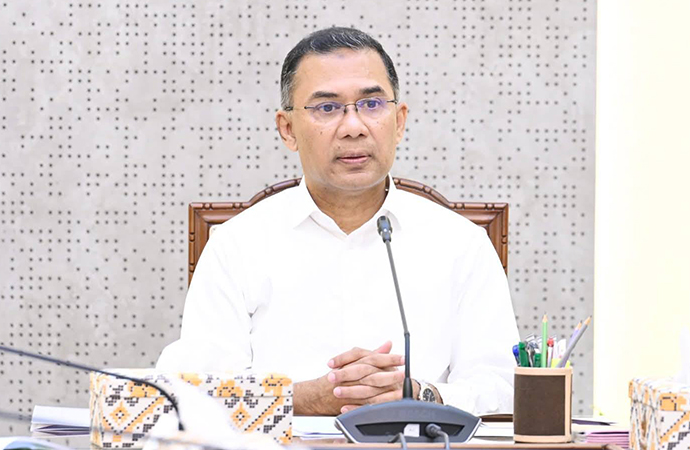
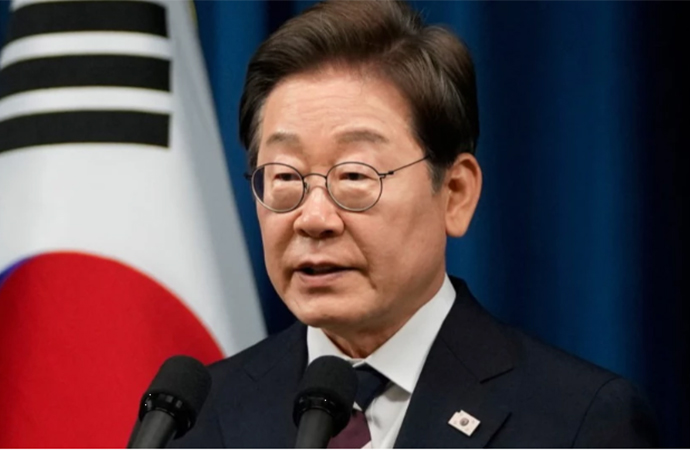
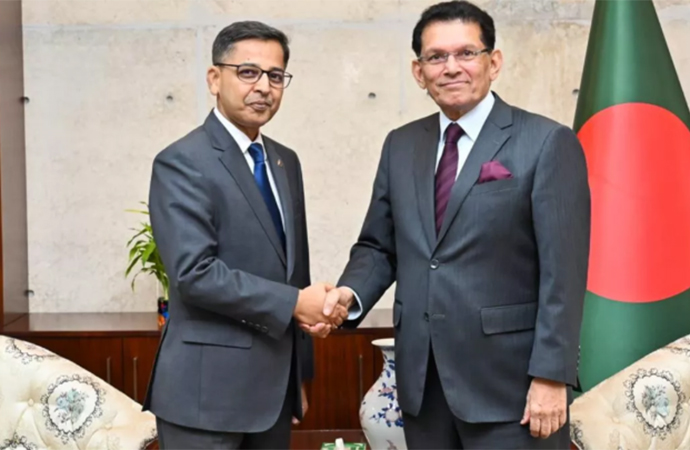
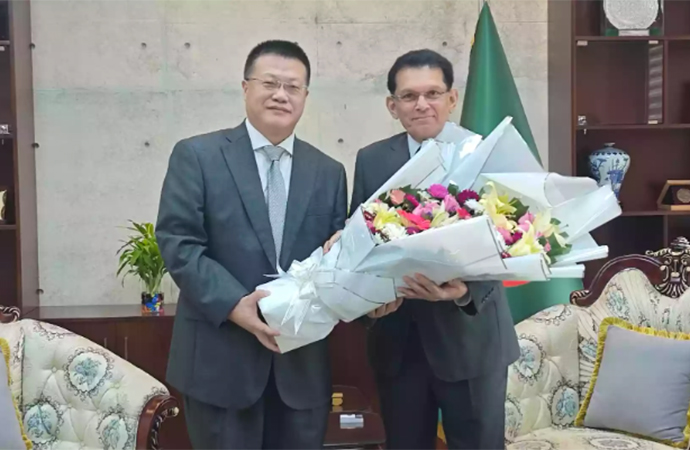
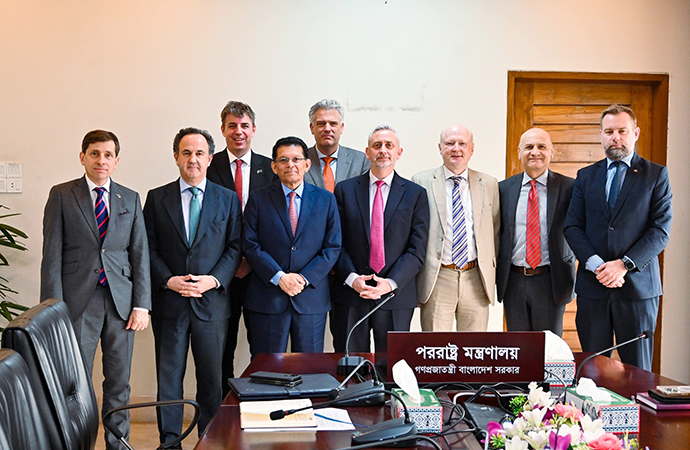
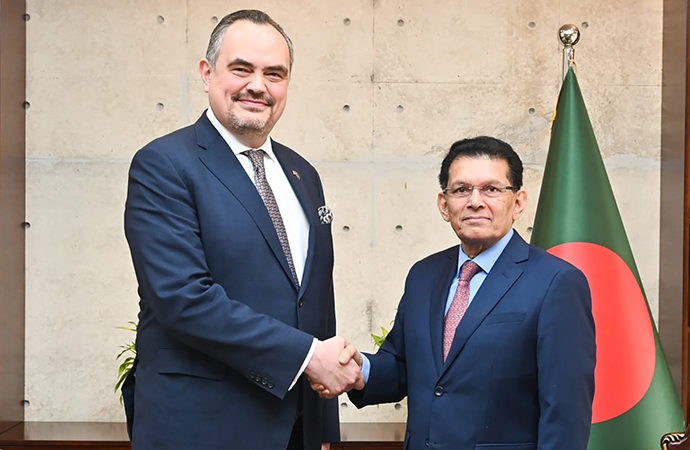













Leave a Comment
Recent Posts
Bangladesh’s first drought-res ...
In a groundbreaking development for Bangladesh’s agriculture, Ga ...
US and Iran hold another round ...
Iran and the United States were holding another round of indirect talk ...
An early hiccup for the new government?
Japan invites PM Tarique, eyes cooperation with Bang ..
Bangladesh to achieve sustained growth, prosperity u ..
Dhaka indicates ‘forward looking, balanced partnersh ..